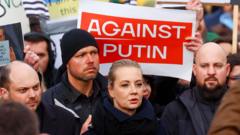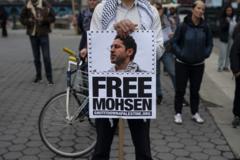In a poignant display of defiance, Russia's exiled opposition mobilized in Berlin, underscoring their vehement opposition to President Vladimir Putin and the ongoing war in Ukraine.
Russia's Exiled Opposition Stages Protest in Berlin Against Putin and the War

Russia's Exiled Opposition Stages Protest in Berlin Against Putin and the War
Thousands Join Yulia Navalnaya to Demand Action on Ukraine Conflict
As the march unfolded in the heart of Berlin, Yulia Navalnaya, the widow of the late opposition leader Alexei Navalny, led the strong crowd fiercely opposing the Kremlin's actions. Bereft of their homeland, several thousand demonstrators rallied, driven by a deep sense of urgency against what many view as a tyrannical regime. They carried both Ukrainian and the blue and white opposition flags while shouting slogans in Russian such as "no to war" and "Putin is a killer."
The demonstration, a response to the Kremlin's intensified crackdown on dissent, spotlighted three critical demands from the opposition: the "immediate withdrawal" of Russian forces from Ukraine, holding Putin accountable as a "war criminal," and freeing all political prisoners within Russia.
Amid the crowd, Oleg Orlov, co-chair of the Nobel Peace Prize-winning organization Memorial, held a banner proclaiming "Victory for Ukraine, Defeat for Putin, Freedom for Russia." Released from Russian captivity in August following a prisoner exchange, Orlov underlined the necessity of providing Ukraine with additional military supplies, arguing that Putin's victory would reinforce his oppressive regime in Russia.
Clarity of purpose shone through as the protesters assembled at the Russian embassy, deemed by Vladimir Kara-Murza, another opposition figure recently freed from jail, as "a spy nest of Russia." He expressed hope that the site would eventually reclaim its original role as a diplomatic outpost.
One protestor, Anastasia, shared her story of leaving Russia amid the war, echoing sentiments felt by many as she highlighted the challenges of protesting within a repressive political climate.
Demonstrations like these showcase the dedication of the Russian opposition to raising awareness and spurring action against the injustices they face under Putin’s regime, as they continue to advocate for a different future for their country.
The demonstration, a response to the Kremlin's intensified crackdown on dissent, spotlighted three critical demands from the opposition: the "immediate withdrawal" of Russian forces from Ukraine, holding Putin accountable as a "war criminal," and freeing all political prisoners within Russia.
Amid the crowd, Oleg Orlov, co-chair of the Nobel Peace Prize-winning organization Memorial, held a banner proclaiming "Victory for Ukraine, Defeat for Putin, Freedom for Russia." Released from Russian captivity in August following a prisoner exchange, Orlov underlined the necessity of providing Ukraine with additional military supplies, arguing that Putin's victory would reinforce his oppressive regime in Russia.
Clarity of purpose shone through as the protesters assembled at the Russian embassy, deemed by Vladimir Kara-Murza, another opposition figure recently freed from jail, as "a spy nest of Russia." He expressed hope that the site would eventually reclaim its original role as a diplomatic outpost.
One protestor, Anastasia, shared her story of leaving Russia amid the war, echoing sentiments felt by many as she highlighted the challenges of protesting within a repressive political climate.
Demonstrations like these showcase the dedication of the Russian opposition to raising awareness and spurring action against the injustices they face under Putin’s regime, as they continue to advocate for a different future for their country.






















